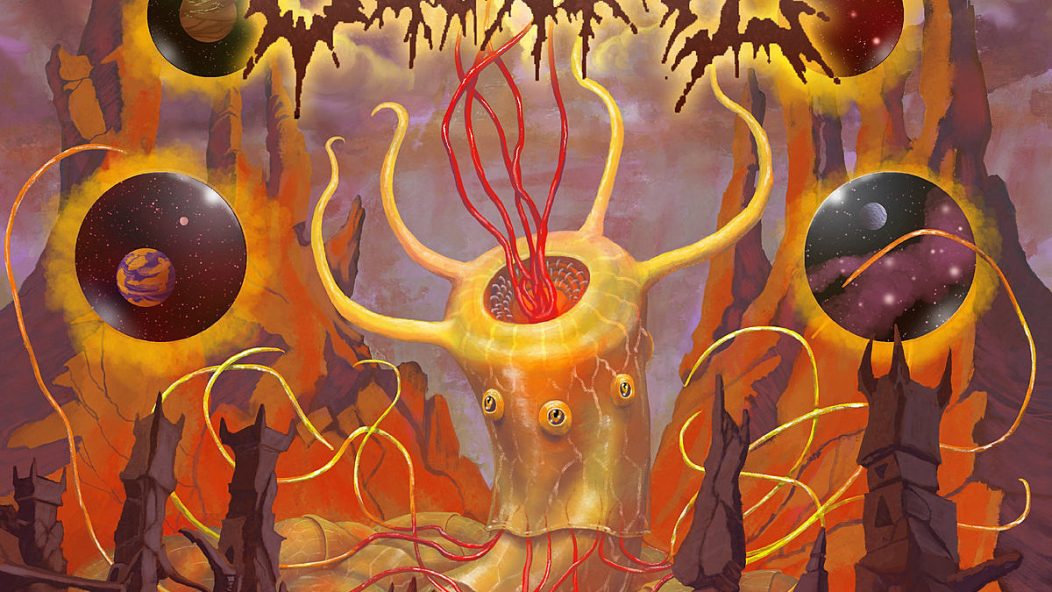
Piercing the Veil #5: Slugdge, Gastropods, and the Absurdity of Metal
Metal has a reputation of being a matter of life and death, despite its occasionally silly presentation. Corpse-painted ghouls and barrel-chested conquerors stand shoulder-to-shoulder among metal’s most coveted offerings. To Slugdge’s Matt Moss, the genre’s appeal is its ridiculousness. “Metal’s attitude – to me, my personal view of heavy metal – lends itself extremely well to outrageous things. Other genres feel trapped when they try to do it.” His UK technical death metal outfit relishes in metal’s latent farce. He channels it into the story of Mollusca, a primordial and supremely powerful gastropod, and the horrors faced by those unlucky enough to encounter the slimy leviathan. Though he touts Mollusca’s sermon, he reduces the lore to, “Whatever you think Mollusca can do he has done, and that’s all that matters.”
Slugdge’s veil might be thicker than any other artist covered thus far. Their chronicles of the cosmic slug overlord Mollusca, told through anatomical puns, Lovecraftian lexicon, and unyielding death metal are merely means to an end. “The stuff in Slugdge was taking the piss out of people’s, and my own, deluded behaviours, and the religious mentality and people looking for answers. When we started it was pure therapy for me,” Moss says. Mollusca is so beyond human comprehension that he becomes a blank canvas. Moss morphs the sentient slug into a medium through which he can ridicule his past delusions.
..
..
Moss, alongside bandmate Kev Pearson, conceived the sci-fi slug concept after recovering from a psychotic episode in his youth. He battled delusions of grandeur and paranoia and was eventually admitted to a hospital. There, the doctors said he’d never recover. His high medication dosage and internal struggles eventually coalesced into suicidal ideations, but in what he describes as one of his proudest achievements he clawed his way out with a newfound levity.
Despite now orbiting a more light-hearted space, Moss is dedicated enough to take his craft to his grave. That sounds hyperbolic. It is not. While recording Gastronomicon in 2014 Moss was stricken with a concoction of viruses that doctors mistook for cancer. The health scare placed him near his gravestone, and he used the severity as motivation to finish the album. Sarcastically, he claims he needed to spread Mollusca’s gospel, or else he would’ve been punished.
In a way, Slugdge is a personal outlet for Moss, though he doesn’t impose anything other than oddity. He doesn’t want to impact anyone’s interpretation of his music. This hasn’t stopped fans from dissecting Slugdge beyond Moss’ expectations. One fan annotated “Crop Killer” on genius.com and constructed a narrative of a hive mentality versus rampant individualism. This take isn’t out-of-step with Moss’ real-world beliefs, but it is the opposite of his intent. Whatever personal sentiments he does include are buried deep in the slime. “People can put into the songs whatever they want but I try not to put anything direct,” he says. “We’ve got songs about personal, awful things, but I would never want to disclose what that’s about because it might taint it for someone.”
That’s the appeal of a blank canvas as ridiculous as Mollusca. Some fans adore Slugdge’s pun fetishization. For others the concept is repulsive. Moss recalls one commenter saying, “A band about slugs? I can’t do that, I prefer to take my music seriously.” But consider two counter-arguments; one, there’s nothing more serious than getting your soul sucked out of your corporal being by ethereal tendrils, and two, Slugdge’s music is as serious as a heart attack. Those who scoff at the concept have yet to listen to Slugdge. Remove the imagery and song titles, and you wouldn’t even know they’re rooted in ridicule.
..
..
It’s expected that the duo would ooze musical pungency with all their talk of slime and mucosal membranes. Instead, their precise death metal favors songcraft over bile. Winding structures hint at universes and knowledge that would reduce our mammalian brains to crème fraîche. It can never be predicted where a Slugdge song will end. They’re outward-looking operas carrying the drama of life-altering extraterrestrial encounters. This otherworldliness, though Moss humbly downplays the term, may come from somewhere beyond. Moss pulled certain tracks, like “The Sound of Mucus,” from his hallucinations. He claims raindrops striking the car produced notes and melodies he later repackaged into songs.
Through Mollusca’s esoterism, Moss reflects how he believes society handles unknown threats. “We have things where it’s like a tiger in the bush, and it shows we’re unequipped. We imagine the tiger in the bush, but it’s probably a bird causing a rustle. We always go to the worst possible thing – a malign force doing stuff outside of our control and I’ve got to rally against it.” Mollusca is that malign force outside of our control that leads to fear and hatred. Moss flips all of that into humorous empathy. Were he less dedicated it would be hollow pandering; it’s hard to make someone a better person if your entire shtick is sloppy puns atop who-gives-a-shit playing. You can tell Moss cares by Slugdge’s evolving sound: their last album Esoteric Malacology is worlds more complex than their debut Born of Slime. He’s doing his part by spreading Mollusca’s gospel, to accept the unknown, delivered through an ageless gonopore in the tapestries of compositionally dense death metal. A little convoluted? It should be. There’s plenty we don’t understand about the universe. We can start making sense of it by studying Mollusca’s message: that none of this has to be taken quite so seriously.
…










